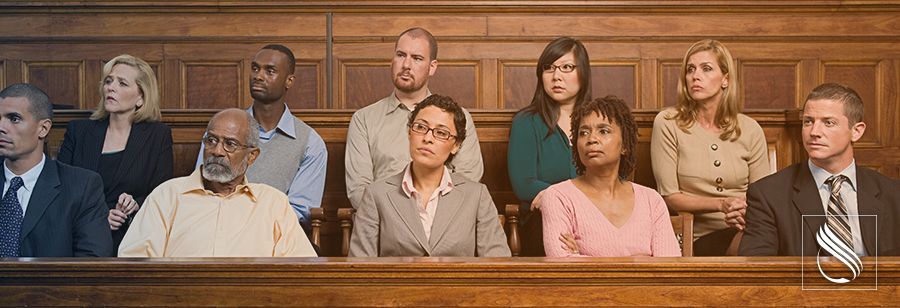I watched the jury deliberating through the small camera positioned at the end of the table. They had been going for several hours and it was a dynamic discussion. The case that had them so animated was that of an elderly lady who had fallen at one of our churches. The fall had broken some bones and she was confined to bed, which made her other health problems worse. It appeared as though the railing she had tried to hold onto during her fall had been loose and given way just when it was needed most.
Some on the jury seemed to be taking a levelheaded approach to the case by balancing the claimant’s personal responsibility against the church’s possible negligence. But it looked to me like a few were simply vindictive, wanted to blame the church for the whole thing, and punish the church as much as possible. They said things like:“This is a church and it seems like they don’t care for their people at all!”
“This is their member! How could they let things like this happen to their own people?”
“What kind of church is this?”
I wanted to respond to them through the camera, even though I had no microphone and their discussion was just a recording. It occurred to me later that if these questions were being asked about an organization other than the church that I love, I might be the one asking the hard questions. Perhaps who I think we are as a church is not what others think we are.
What is Reputational Risk?
Think about an iconic brand name. A brand that is well-known, has lasted a long time, and is well-liked. For brands like these, the name of the brand holds a monetary value separate from the value of the tangible assets owned by the brand’s company. The company has a reputation tied to their brand name that, if damaged, could result in financial loss to that company and their name being valued less than it was before. The same is true for our church.Our brand has a reputation that holds value within our community and society. We can be known as a church that is warm and inviting, or cold and judgmental. We can be known as a church that cares for people, or a church that does not care at all. It is important to protect our reputation. How valuable is our church’s name?
We can be known as a church that cares for people, or a church that doesn't care at all. We must protect our reputation.
Reputational risk is the risk of loss caused by negative publicity, public perception or events that have an adverse impact on an organization’s reputation.
Have you spent any time considering reputational risk, and the damage that can be done to our name and our reputation? We represent something much larger than ourselves. Our activities not only represent our local church or school family, but also represent our local conference. For example, if my actions as church elder lead to a lawsuit against the church, it is the local conference (of which I am a part) that is sued. Likewise, we represent the Seventh-day Adventist world church and, in a larger sense, the Kingdom of God.
Protecting Our Reputation is Simple
What are some ways we can protect the name of our church and all it represents? Fortunately, the ways are simple. They may not always be easy, but they are simple.- Focus on mission - Only do those activities in the name of the church that the church is equipped and has purposed to do well. Ask: is what we are doing being done to the standards expected?
We should be asking ourselves, “What is our mission? What activities are outside of our mission and should be performed by others who are more specialized in that activity?” Staying on mission and being prepared for those risks that are “on mission” will help guard the Adventist Church’s reputation.
- Crisis Communication – when crises occur it is important that we understand how to respond as an organization. The crisis communication plan for your conference should designate:
- who is the spokesperson (usually at the conference or union level),
- what is the message of the organization, and
- ensures that the message is delivered consistently and compassionately.
In a crisis situation, we can be helpful by always referring inquiries to the designated spokesperson in a compassionate manner. We must avoid telling things we know (which may be incomplete or inaccurate), and the other extreme which is saying “No comment!” We should take the approach of saying “You can receive the best and most complete information by speaking to [name of designated spokesperson].” Being prepared to respond to crises that occur will mitigate the impact to reputation.
These ideas can be summarized in the theme of working together. This is meant in a local sense and in a broader sense. Take counsel with your church board before starting a new ministry or planning activities. Do not act alone and outside of the guidelines or policies of the church. The body of Christ works best when it works together selflessly and stays on mission. Together protecting our reputation is not always easy, but it is simple.


